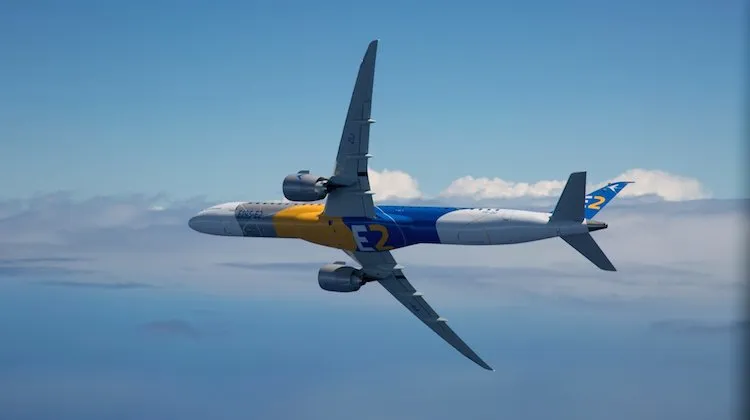
Boeing-Embraer deal gets Brazilian government approval
Jan 10, 2019

Boeing's partnership with Embraer has received the green light from the Brazilian government, marking a significant step in the aerospace industry. This approval allows Boeing to expand its presence in the regional jet market by acquiring a majority stake in Embraer’s commercial aviation division. The deal is expected to enhance competitiveness against rivals in the global market, providing both companies with opportunities for growth and innovation. Supporters believe this collaboration will boost job creation and investment in Brazil’s aerospace sector, while critics express concerns about potential national security implications and the impact on local employment.
The approval of the Boeing-Embraer deal by the Brazilian government marks a significant milestone in the aerospace industry. This strategic partnership not only enhances Boeing's position in the global market but also strengthens Embraer's role in the competitive landscape of aircraft manufacturing. In this article, we will delve into the implications of this deal, its impact on the aviation sector, and the key players involved.
Understanding the Boeing-Embraer Deal
The Boeing-Embraer deal, valued at approximately $4.2 billion, focuses on the formation of a joint venture that combines Boeing’s strengths in commercial aviation with Embraer's expertise in regional jets. This partnership aims to address the growing demand for air travel, especially in emerging markets. By leveraging each other's capabilities, both companies can enhance their product offerings and expand their market reach.
Benefits of the Merger
One of the main benefits of the Boeing-Embraer partnership is the potential for increased operational efficiency. The collaboration allows for shared resources, which can lead to reduced production costs and improved aircraft performance. Additionally, the merger enables both companies to capitalize on each other's technological advancements, fostering innovation in design and manufacturing processes.
Market Position and Competitive Advantage
The approval of the deal comes at a time when the aerospace market is experiencing significant changes. As major airlines seek to modernize their fleets, the demand for new, fuel-efficient aircraft is higher than ever. The Boeing-Embraer partnership positions both companies to capture a larger share of this lucrative market. By combining their product lines, they can offer a more comprehensive range of aircraft solutions to airlines worldwide.
Impact on Employment and Economic Growth
The Boeing-Embraer deal is expected to have a positive impact on employment within Brazil. As the two companies collaborate, there will be a need for skilled labor in various sectors, from engineering to manufacturing. This partnership is likely to create job opportunities and contribute to the economic growth of the region. Furthermore, the deal is anticipated to attract foreign investment, boosting Brazil's aerospace industry and enhancing its global competitiveness.
Potential Challenges Ahead
While the Boeing-Embraer deal presents numerous opportunities, it also faces potential challenges. Regulatory scrutiny from various countries may pose obstacles to the merger's full realization. Governments may impose conditions or limitations to ensure fair competition in the aviation market. Additionally, integrating the two companies' operations could be complex, requiring careful management to avoid disruptions in production and delivery timelines.
Global Reactions to the Approval
The approval of the Boeing-Embraer deal has elicited mixed reactions globally. Industry analysts and stakeholders are optimistic about the potential benefits of this partnership, while some competitors express concerns about the consolidation within the aerospace sector. The outcome of this deal could set a precedent for future mergers and acquisitions in the industry, influencing how companies approach collaboration and competition.
Future Prospects for Boeing and Embraer
Looking ahead, the Boeing-Embraer partnership is poised to redefine the landscape of regional aviation. With an increased focus on sustainability and innovation, both companies are expected to invest heavily in research and development. This could lead to the introduction of next-generation aircraft that are not only more efficient but also environmentally friendly.
Conclusion
The Brazilian government's approval of the Boeing-Embraer deal signifies a new chapter for both companies and the global aerospace industry. By combining their strengths, Boeing and Embraer can better meet the evolving demands of airlines and passengers alike. As the aviation market continues to grow and change, this partnership could pave the way for future innovations and collaborations, ultimately shaping the future of air travel.
Key Takeaways
| Key Aspects | Description |
|---|---|
| Deal Value | $4.2 billion |
| Joint Venture Focus | Combining commercial aviation and regional jets expertise |
| Employment Impact | Potential job creation in Brazil |
| Market Position | Stronger competitive stance in the aerospace sector |
| Challenges | Regulatory scrutiny and integration complexities |
The Boeing-Embraer deal is a pivotal moment in the aerospace industry, and its implications will be felt for years to come. As both companies navigate the challenges and opportunities ahead, the focus will remain on innovation, efficiency, and meeting the needs of an evolving market.
Related Articles

Explore Thailand: The Best Islands to Visit for Paradise, Adventure, and Relaxation

The Ultimate Guide to the Best Islands in Thailand for Your Next Getaway

Do babies need passports? How to get a passport for a newborn

How to get a U.S. passport fast: here’s how to expedite the process

What is Mobile Passport Control: 5 reasons why you should use it

SENTRI vs. Global Entry: A detailed guide

Do you need a passport to go to the Bahamas? Let’s find out

Do you need a passport to go to Mexico? A detailed guide

Do you need a passport to go to Canada? We got the answer

Do You Need a Passport for a Cruise: An Essential Travel Guide

Booster Seat Requirements: All the Rules to Follow in Your Rental Car

What Are the World’s Most Powerful Passports, and How Does Yours Rank?

How to Take a Passport Photo at Home: A Helpful Guide

You've got to have heart! Southwest's new livery

Your opinion: Should water be free on low cost carriers?

Young women bolder than guys as solo travellers
